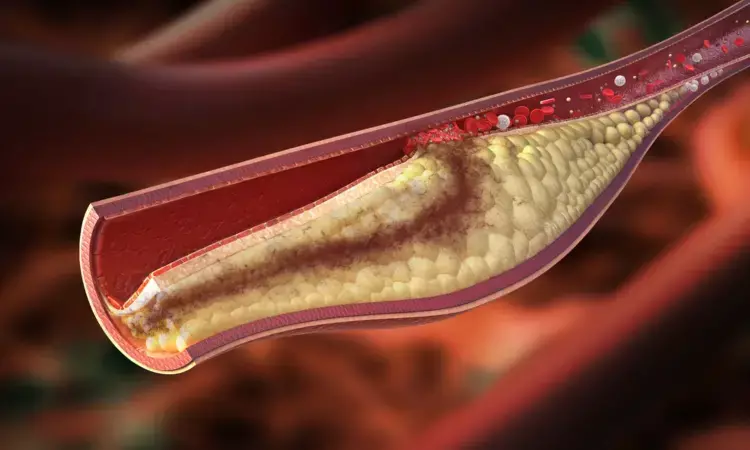- Home
- Medical news & Guidelines
- Anesthesiology
- Cardiology and CTVS
- Critical Care
- Dentistry
- Dermatology
- Diabetes and Endocrinology
- ENT
- Gastroenterology
- Medicine
- Nephrology
- Neurology
- Obstretics-Gynaecology
- Oncology
- Ophthalmology
- Orthopaedics
- Pediatrics-Neonatology
- Psychiatry
- Pulmonology
- Radiology
- Surgery
- Urology
- Laboratory Medicine
- Diet
- Nursing
- Paramedical
- Physiotherapy
- Health news
- Fact Check
- Bone Health Fact Check
- Brain Health Fact Check
- Cancer Related Fact Check
- Child Care Fact Check
- Dental and oral health fact check
- Diabetes and metabolic health fact check
- Diet and Nutrition Fact Check
- Eye and ENT Care Fact Check
- Fitness fact check
- Gut health fact check
- Heart health fact check
- Kidney health fact check
- Medical education fact check
- Men's health fact check
- Respiratory fact check
- Skin and hair care fact check
- Vaccine and Immunization fact check
- Women's health fact check
- AYUSH
- State News
- Andaman and Nicobar Islands
- Andhra Pradesh
- Arunachal Pradesh
- Assam
- Bihar
- Chandigarh
- Chattisgarh
- Dadra and Nagar Haveli
- Daman and Diu
- Delhi
- Goa
- Gujarat
- Haryana
- Himachal Pradesh
- Jammu & Kashmir
- Jharkhand
- Karnataka
- Kerala
- Ladakh
- Lakshadweep
- Madhya Pradesh
- Maharashtra
- Manipur
- Meghalaya
- Mizoram
- Nagaland
- Odisha
- Puducherry
- Punjab
- Rajasthan
- Sikkim
- Tamil Nadu
- Telangana
- Tripura
- Uttar Pradesh
- Uttrakhand
- West Bengal
- Medical Education
- Industry
CIMT may predict risk of new-onset diabetes and diabetic neuropathy, finds study

Bulgaria: In a quest to unravel the intricate links between metabolic health and cardiovascular risk, a recent study has delved into the common carotid artery intima-media thickness (CIMT) in individuals with prediabetes and those newly diagnosed with type 2 diabetes mellitus (T2DM). The findings, published in the Journal of Diabetes and its Complications, offer valuable insights into early vascular changes associated with these conditions, potentially paving the way for enhanced risk stratification and preventive interventions.
The study found significantly greater intima-media thickness of the common carotid artery and a greater frequency of abnormal CIMT values in patients with new-onset diabetes compared to those with prediabetes and normoglycemia.
"CIMT has a high predictive value for the presence of sudomotor dysfunction, diabetic neuropathy, and the risk of new-onset diabetes," the researchers wrote.
Antoaneta Gateva, University Hospital Alexandrovska, Bulgaria, and colleagues aimed to evaluate the relationship between common carotid artery intima-media thickness in patients with prediabetes and new-onset diabetes mellitus without proven cardiovascular disease (CVD) and some classic cardio-metabolic risk factors.
The study included 461 obese patients with an average age of 53.2 ± 10.7 years. They were divided into three groups - group 1 without carbohydrate disturbances (n = 182), group 2 with prediabetes (n = 193), and group 3 with newly diagnosed diabetes mellitus (n = 86).
Based on the study, the researchers reported the following:
- The patients with new-onset diabetes had significantly higher mean CIMT values compared to those with prediabetes or without carbohydrate disturbances and a higher frequency of abnormal IMT values.
- CIMT correlated significantly with age, systolic BP, diastolic BP, and fasting blood glucose and showed a high predictive value for the presence of diabetic neuropathy and sudomotor dysfunction.
- Patients with abnormal CIMT values had a higher incidence of dyslipidemia, arterial hypertension, peripheral neuropathy, metabolic syndrome, and sudomotor dysfunction.
- Patients who developed type 2 diabetes during follow-up had a significantly higher initial mean CIMT, which showed the highest predictive value for the risk of new-onset diabetes with CIMT≥0.7 mm, having 83% specificity and 53% sensitivity for the risk of progression to diabetes mellitus.
The findings show a clear association between increased IMT and the presence of sudomotor dysfunction and diabetic neuropathy. A high predictive value was also found for the presence of these complications. As CIMT is much easier to measure than a full Ewing battery, the study findings can be used to select patients for further evaluation for autonomic dysfunction.
"The results show that the significant predictive value of CIMT is present in patients above 45 years of age, so according to us, CIMT measurement should be performed in obese patients over 45 years of age and in cases where abnormal results are present (≥0.7 mm), the patients should be referred to carbohydrate and autonomic function evaluation," the researchers wrote.
"Despite the abundance of data on the relationship between CIMT, carbohydrate disturbances, and the CVD risk progression, we demonstrate for the first time its predictive role for progression to diabetes in obese patients," they concluded.
Reference:
Gateva, A., Assyov, Y., Karamfilova, V., & Kamenov, Z. (2024). Common carotid artery intima media thickness (CIMT) in patients with prediabetes and newly diagnosed type 2 diabetes mellitus. Journal of Diabetes and its Complications, 38(7), 108766. https://doi.org/10.1016/j.jdiacomp.2024.108766
Dr Kamal Kant Kohli-MBBS, DTCD- a chest specialist with more than 30 years of practice and a flair for writing clinical articles, Dr Kamal Kant Kohli joined Medical Dialogues as a Chief Editor of Medical News. Besides writing articles, as an editor, he proofreads and verifies all the medical content published on Medical Dialogues including those coming from journals, studies,medical conferences,guidelines etc. Email: drkohli@medicaldialogues.in. Contact no. 011-43720751


